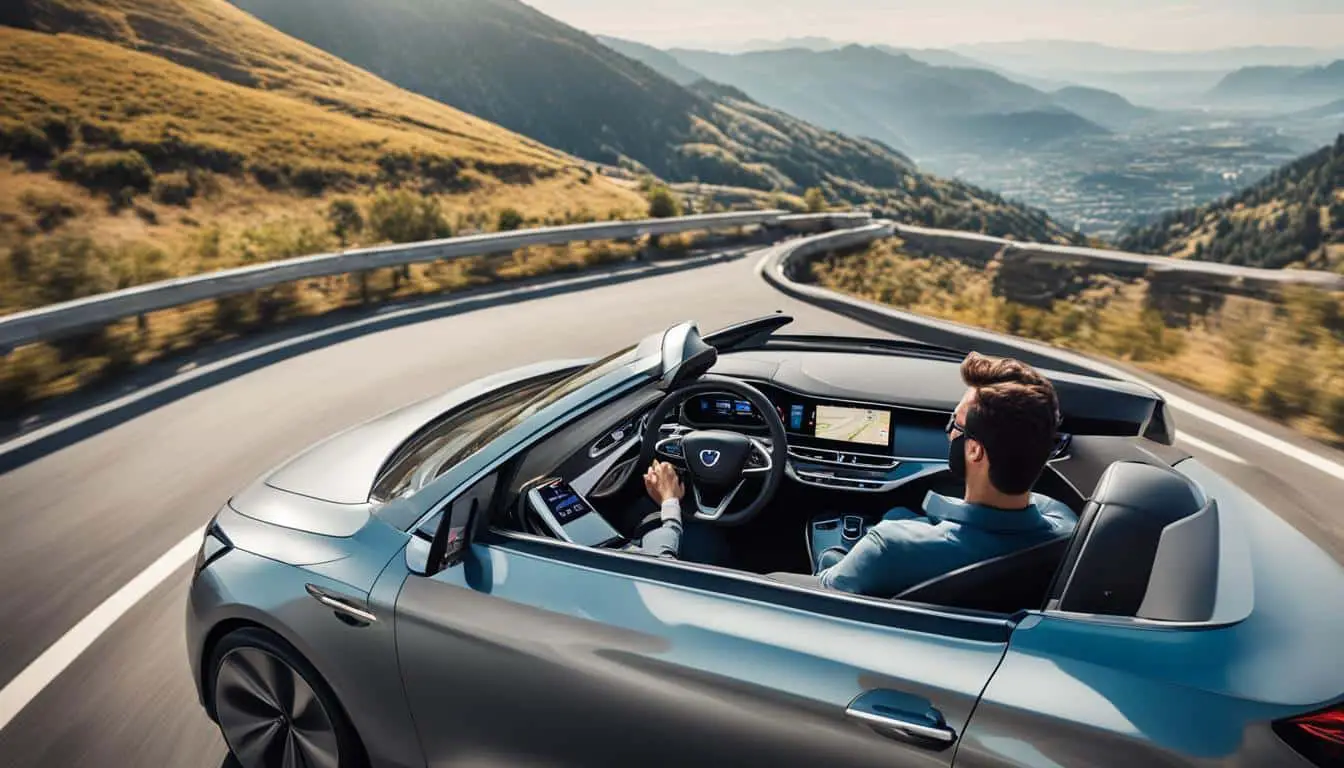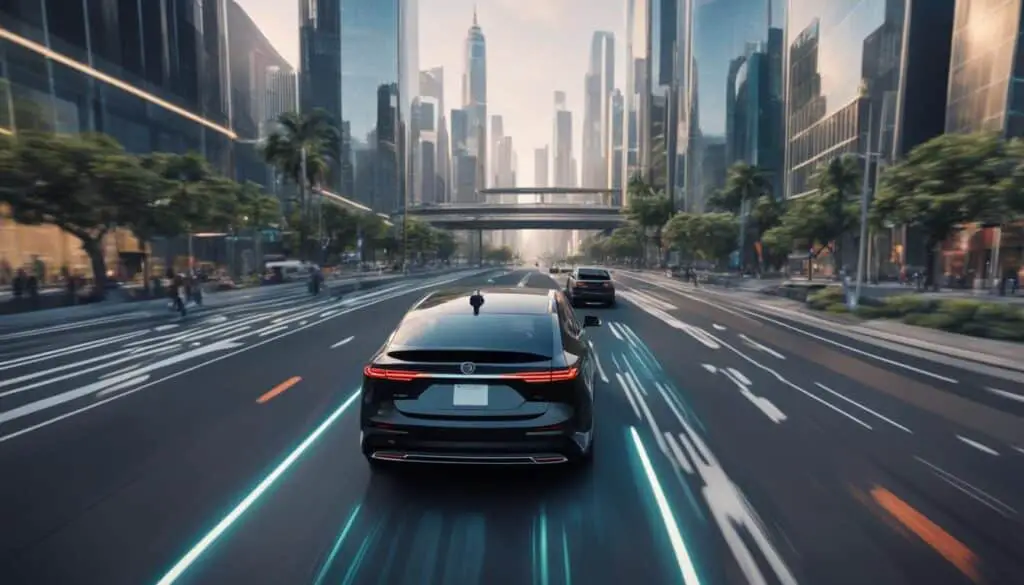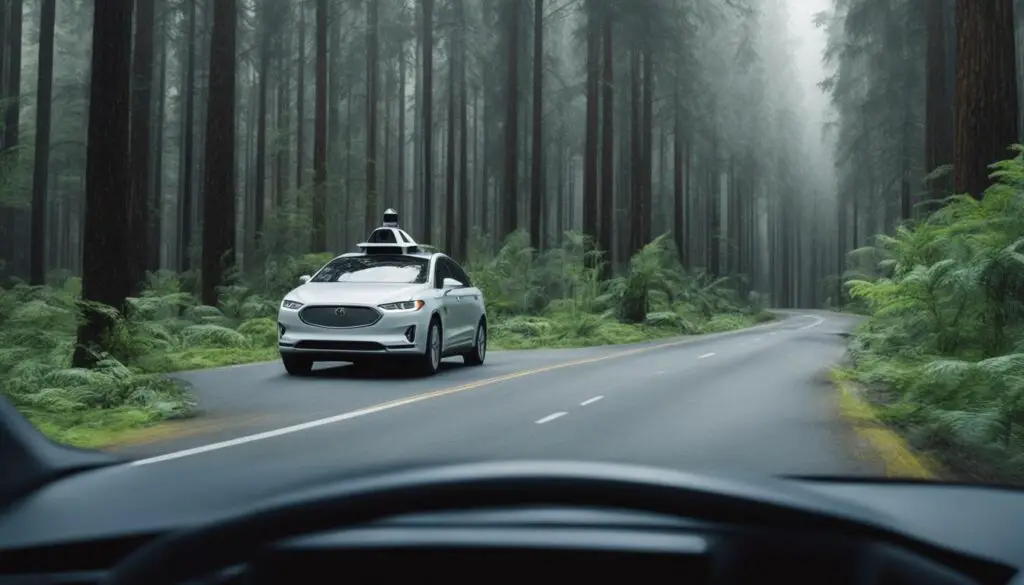
Understanding Consumer Perceptions of Self-Driving Cars
When it comes to self-driving cars, consumer perceptions play a crucial role in shaping the future of this transformative technology. As a journalist, I have delved deep into the subject to gain a comprehensive understanding of how consumers view self-driving cars and what factors influence their trust, safety concerns, and acceptance. In this article, I will share my insights on consumer perceptions of self-driving cars and the key factors that shape their attitudes and behaviors.
Key Takeaways:
- 51% of car buyers see themselves switching to some version of a fully autonomous vehicle in the future.
- Safety is a top concern for consumers, with the need for trust and firsthand experience being crucial.
- Consumers have a growing interest in increased degrees of driving assistance and technology-enabled autonomy.
- Understanding brand preferences and associations is essential in shaping consumer perceptions of self-driving cars.
- Consumer emotions surrounding self-driving cars are mixed, with anticipation and fear coexisting.
The Role of Brands in Consumer Perceptions of Self-Driving Cars
A study on brand extensions in the context of autonomous cars reveals fascinating insights into consumer preferences when it comes to buying or renting self-driving cars. Brand image associations and brand preferences play a crucial role in shaping consumer perceptions in this rapidly evolving market.
In terms of brand preference, the study found that consumers have different preferences for buying and renting self-driving cars. While technology brands are generally preferred, consumers tend to favor automaker brands over new brands when purchasing a self-driving car. This preference for established automaker brands suggests a level of trust and familiarity among consumers.
However, when it comes to renting a self-driving car, consumers are more open to new brands, possibly due to the temporary nature of the rental experience. This indicates that brand loyalty may be less influential when renting a self-driving car compared to purchasing one.
The study also highlights the importance of brand image associations in influencing brand strength. Well-established brands like Google benefit from strong parent brand positioning, creating positive associations that extend to their self-driving car initiatives. These associations can enhance the trust and perception of reliability that consumers have towards the brand.
Overall, brand preferences play a significant role in consumer perceptions of self-driving cars. Consumer trust, familiarity, and positive brand image associations are essential factors that influence the acceptance and adoption of autonomous vehicles. Automaker brands and technology brands have different levels of appeal depending on whether consumers are buying or renting self-driving cars.
Consumer Preferences for Brand Types in Buying and Renting Self-Driving Cars
| Brand Type | Buying | Renting | |
|---|---|---|---|
| Brand Preference | Automaker Brands | Preferred | Less Preferred |
| Technology Brands | Less Preferred | Preferred |
The table above illustrates the different brand preferences for buying and renting self-driving cars. Automaker brands are preferred when purchasing, while technology brands are more appealing when renting. This distinction highlights the influence of consumer preferences and the significance of brand choice in the autonomous vehicle industry.
Quote:
“Consumer trust and familiarity with established automaker brands play an instrumental role in shaping their perceptions of self-driving cars.”
Consumers’ perceptions of self-driving cars are undoubtedly shaped by brand preferences and associations. As the industry continues to evolve, automaker brands and technology brands will continue to vie for consumer attention. Understanding the role that brands play in shaping consumer perceptions is crucial for organizations looking to gain a competitive edge in the self-driving car market.
Consumer Emotions and Readiness for Self-Driving Cars
When it comes to self-driving cars, consumer emotions are a complex mix of anticipation, joy, fear, and anxiety. The idea of cars that can drive themselves evokes both excitement for the possibilities it brings and concerns about safety and control. However, despite these mixed emotions, a recent survey revealed that a majority of consumers (59%) expressed anticipation for the future of self-driving cars.
Interestingly, Chinese consumers and millennials/urbanites showed an especially positive outlook towards self-driving cars. This indicates that there is a level of consumer readiness and interest in embracing this transformative technology.
Self-driving cars have the potential to revolutionize transportation, making roads safer, reducing traffic congestion, and providing greater mobility for people of all ages and abilities. As consumers become more familiar with autonomous vehicles and their benefits, acceptance and readiness grow.
So what drives this anticipation? For many, it’s the promise of convenience, improved safety, and enhanced productivity. Self-driving cars have the potential to free up valuable time that would otherwise be spent behind the wheel. Commuters could catch up on work, relax, or even socialize during their daily journeys. This vision of a more connected and efficient future contributes to the positive emotions surrounding self-driving cars.
Although concerns and skepticism may still exist, it’s clear that consumers are ready to embrace self-driving technology. As autonomous vehicles continue to evolve and become more commonplace, addressing consumer emotions, gaining trust, and ensuring safety will be critical for widespread adoption.
“Self-driving cars have the potential to revolutionize transportation, making roads safer, reducing traffic congestion, and providing greater mobility for people of all ages and abilities.”
Anticipation and Readiness among Consumers
- 59% of consumers express anticipation for the future of self-driving cars
- Chinese consumers and millennials/urbanites show particularly positive attitudes
- Convenience, improved safety, and enhanced productivity are key drivers of anticipation
Consumer Expectations for In-Car Experiences and Benefits of Self-Driving Cars
When it comes to self-driving cars, consumers have high expectations for the in-car experience. These expectations have far-reaching implications for various industries such as media and entertainment, retail, and healthcare. A survey conducted among consumers revealed some fascinating insights into their desires and preferences.
“I want to spend the time saved by self-driving cars in socializing and enjoying my surroundings. The convenience of not having to focus on driving allows me to connect with family, friends, and even meet new people on my commute.”
– Consumer quote
One of the key expectations consumers have is the ability for self-driving cars to perform tasks beyond just transportation. They envision a future where these vehicles can pick up or drop off family members and friends, run errands, or even serve as mobile offices. This expanded capability of self-driving cars aligns with their desire to save time and make the most out of their daily routines.
Moreover, self-driving cars present an opportunity for consumers to disconnect from digital tools and reconnect with the world around them. By relinquishing control of the steering wheel, consumers can enjoy the benefits of autonomous travel, such as enjoying the scenery and engaging in activities that they normally wouldn’t have time for.
Benefits of Self-Driving Cars:
- Time-saving: Self-driving cars enable consumers to utilize commute time for more productive and enjoyable activities.
- Convenience: The expanded capabilities of self-driving cars, such as running errands and picking up passengers, offer increased convenience in daily life.
- Disconnecting from digital tools: Self-driving cars provide an opportunity to disconnect from devices and reconnect with the world around us.
Overall, consumers have high expectations for the in-car experiences offered by self-driving cars. They see these vehicles as a means to improve their lives by saving time, enhancing convenience, and disconnecting from digital tools. As self-driving technology continues to advance, meeting these expectations will be crucial for its widespread adoption and integration into our daily lives.

Consumer Trust and Safety Concerns with Self-Driving Cars
Consumer trust and safety are crucial factors when it comes to the adoption of self-driving cars. Although the acceptance of self-driving cars is growing, many consumers still harbor safety concerns, which hinder their willingness to share the road with fully autonomous vehicles. In fact, fewer than one in three consumers currently feel safe in such situations.
A recent survey revealed that consumers tend to trust automotive original equipment manufacturers (OEMs) more than new startups when it comes to ensuring the safety of self-driving cars. This preference for established automakers highlights the significance of brand reputation and expertise in building trust with consumers.
For organizations looking to gain consumer trust and accelerate the adoption of self-driving cars, it is vital to address safety concerns head-on. This includes implementing robust safety measures, conducting thorough testing and validation processes, and fostering transparency in the development and deployment of autonomous vehicles. By prioritizing safety and security, organizations can instill confidence in consumers and establish a solid foundation for the widespread acceptance of self-driving cars.

The Importance of Safety and Security
“Consumer trust in self-driving cars relies heavily on safety and security. Without addressing these concerns, the full potential of autonomous vehicles may not be realized.”
Trust is the cornerstone of consumer acceptance, and safety is a non-negotiable aspect when it comes to autonomous vehicles. Ensuring the reliability and security of self-driving cars is paramount for both the industry and consumers. It is crucial to invest in state-of-the-art technology, enhance cybersecurity measures, and establish robust industry standards to mitigate safety risks and instill confidence in consumers.
Building Consumer Trust
Building consumer trust in self-driving cars requires a multi-faceted approach. Companies need to educate the public about the technological advancements and safety features of autonomous vehicles. Transparent communication about the benefits, limitations, and continuous improvements can help dispel misinformation and foster trust in self-driving technology.
Collaboration between automakers, regulatory bodies, and advocacy groups can further strengthen consumer trust. By working together, stakeholders can develop and implement safety guidelines, establish responsible AI practices, and create frameworks to address potential safety concerns that arise with the advancement of self-driving cars.
The Road Ahead
“As the self-driving car industry continues to evolve, it is imperative to prioritize consumer trust and safety. By doing so, we can unlock the full potential of self-driving technology and create a future that is safer, more efficient, and more enjoyable for all.”
Consumer trust and safety concerns with self-driving cars will shape the future of autonomous vehicle adoption. Organizations that actively address these concerns and prioritize safety will be well-positioned to earn consumer confidence and accelerate the widespread acceptance of self-driving cars.
Conclusion
In conclusion, consumer perceptions of self-driving cars are shaped by various factors, including brand preferences, trust, safety concerns, and expectations for in-car experiences. The growing acceptance of self-driving cars indicates that consumers are ready for this revolutionary technology. However, they have mixed emotions, experiencing both anticipation and apprehension.
Brand image associations hold significant influence over consumer preferences in the self-driving car market. When it comes to purchasing a self-driving car, consumers tend to favor trusted automaker brands. To accelerate the adoption of self-driving cars, organizations should prioritize building consumer trust and ensuring safety. Meeting consumer expectations for in-car experiences is also crucial.
To successfully navigate the evolving landscape of self-driving cars, companies must effectively communicate the benefits of this emerging technology. By highlighting the advantages of self-driving cars, such as improved safety, convenience, and time savings, organizations can address consumer perceptions and drive acceptance. Understanding consumer preferences and aligning brand strategies accordingly will be pivotal for success in the self-driving car industry.
FAQ
What percentage of car buyers could see themselves switching to fully autonomous vehicles in the future?
According to a McKinsey Mobility Consumer Pulse survey, 51% of car buyers could see themselves switching to some version of a fully autonomous vehicle in the future.
What are the top concerns for consumers regarding self-driving cars?
Safety is a top concern for consumers, with many expressing a need to learn more and experience the technology firsthand in order to build trust.
Are consumers interested in increasing degrees of driving assistance and technology-enabled autonomy?
Yes, while some consumers rarely use advanced driver assistance system (ADAS) features in their current cars, there is a growing interest in increasing degrees of driving assistance and technology-enabled autonomy in future purchases.
What are the preferred brands when it comes to buying or renting self-driving cars?
While technology brands are generally preferred, consumers favor automaker brands over new brands when purchasing, but not when renting.
How does brand image association influence consumer preferences of self-driving cars?
Brand image associations play a significant role in influencing brand preferences of self-driving cars. For example, Google’s strong brand positioning can be attributed to experiences with the parent brand.
How do consumers feel about self-driving cars?
Consumer emotions surrounding self-driving cars are mixed, with feelings of anticipation and joy, but also fear and anxiety. However, a survey found that a majority of consumers (59%) expressed anticipation for the future of self-driving cars.
Are there specific consumer segments that are more positive about self-driving cars?
Yes, Chinese consumers and millennials/urbanites were found to be particularly positive about self-driving cars, indicating consumer readiness and interest in self-driving technology.
What are the expectations of consumers for the in-car experience of self-driving cars?
Consumers have high expectations for the in-car experience of self-driving cars. They want to spend the time saved by self-driving cars in socializing and expect expanded capabilities, such as having self-driving cars pick up or drop off family members and friends, and running errands.
What are the key concerns for consumers when it comes to self-driving cars?
Consumer trust and safety are key concerns when it comes to self-driving cars. While acceptance is growing, fewer than one in three consumers currently feel safe sharing the road with fully autonomous vehicles.
Who do consumers trust more in ensuring the safety of self-driving cars?
Consumers trust automotive original equipment manufacturers (OEMs) over new startups in ensuring the safety of self-driving cars.
